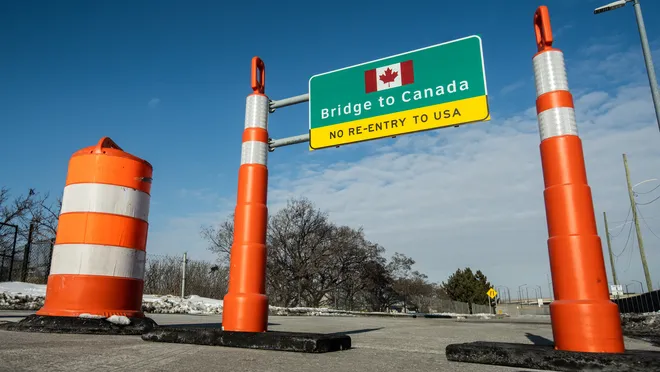A protest on the Ambassador Bridge by Canadian truckers critical of pandemic vaccine mandates has shut down the international gateway for two days, creating traffic gridlock, concerning businesses and making headlines.
Truckers calling themselves the Freedom Convoy are opposing a Canadian mandate requiring drivers entering Canada to be fully vaccinated or face testing and quarantine requirements.
At about 9:15 p.m. Tuesday, the Michigan Department of Transportation tweeted an all-caps update to the situation, warning travelers: “BRIDGE TO CANADA IN DETROIT IS CLOSED.”
Canadian truckers blocked traffic Monday on the suspension bridge, preventing motorists from passing and eventually shutting down the international gateway.
U.S.-bound bridge traffic reopened early Tuesday, a day after the ongoing protest forced the busy span to close, but the U.S. side was still impassable, setting off a firestorm of political activity and tough talk.
The Michigan Department of Transportation began suggesting Tuesday morning the Detroit-Windsor Tunnel or the Blue Water Bridge — which goes from Port Huron to Sarnia, Ontario — as alternative routes.
By Tuesday night, more protesters joined and began blocking the Blue Water Bridge. Although it’s still open, the wait times are reaching 90 minutes for commercial vehicles and the line stretches 6 miles.
It was unclear Tuesday night when the bridge — one of America’s busiest international border crossings — would fully reopen and how seriously it was affecting commerce.
Both Detroit and Windsor have significant auto operations and the standstill is a huge concern for businesses that already have been suffering from global supply chain and local staffing issues.
“We have not heard of any measurable disruptions at this time,” Joe McCabe, CEO of AutoForecast Solutions of Chester Springs, Pennsylvania, told the Free Press. “If there is, we expect there will be a delay in the impact which we would hear in the next few days.”
Shane Wark, assistant to Unifor National President Jerry Dias, representing autoworkers in Canada, said Canada’s auto industry already faces a “barrage of supply chain challenges” in a statement Tuesday night.
“These blockades at border crossings serve no purpose other than to attack workers’ jobs by threatening production slowdowns and additional periods of layoff,” he said. “They must come to an end.”
Stellantis spokeswoman Jodi Tinson said the automaker cut shortits morning shift at Windsor Assembly Plant, which produces the Chrysler Pacifica minivan, because of a parts shortage.
But General Motors said it had not experienced problems yet.
“We are certainly aware of the situation and working closely with our logistics providers to mitigate any potential impacts,” GM spokesman David Barnas said. “But no impacts to report on our plants or operations.”
Ford Motor Company declined to comment on the situation.
Before targeting the bridge, truckers also protested in Ottawa, Canada’s capital.
And there are now growing concerns that not only is the protesters’ fight spilling over the border to affect U.S. businesses and interrupt supply chains, but U.S. truckers may also be organizing similar protests in Washington and elsewhere.
Matt Moroun, chairman of the Detroit International Bridge Co. which owns the span, called on officials “to alleviate the situation” in a manner that “reflects mutual respect,” adding his family sympathizes with “those caught up in this blockade.”
“We recognize that truck drivers are essential workers” and “the Canadian government has done a tremendous job with vaccine rates. The Ambassador Bridge has a solemn obligation to facilitate safe and efficient international trade and travel.”


